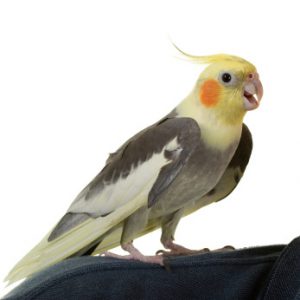Cockatiel there’s a reason why the cockatiel is one of the most popular companion birds — this slender Australian parrot can be both cuddly and bold. Cockatiels can also be curious and, at times, feisty. With a cockatiel in the house, you are likely to hear a repertoire of chirps and whistles.

Cuddly, outgoing, and comical are just three reasons why the cockatiel is the No. 1 pet bird in America. Cockatiels are also talent whistlers, and male cockatiels in particular are known for their whistle serenades, which can be direct at their favor person, their favorite object or their mirror reflection. When not whistling or keeping themselves busy foraging for food and fun around the cage, cockatiels often enjoy spending their downtime snuggling on their favor person’s shoulder. A healthy, well-socialize cockatiel can make a great family pet and is also ideal for apartment living.
Native Region / Natural Habitat
Cockatiels are native to the semi-arid regions of Australia. This open environment might be a reason why cockatiels don’t have the ear-piercing screech of parrots originating from dense rain-forest habitats. Wild cockatiels fly to the ground to forage for food. Cockatiels readily breed in the wild, and they are also easy to breed in captivity, which makes them widely available as pets at a lower cost than most other parrot species. Wild cockatiels are always on alert for predators and are light sleepers. A pet cockatiel might have an occasional night-fright episode, where it thrashes around the cage at night as if startled. You can help your cockatiel find its way back to its perch by leaving a night light on in its room.
Care & Feeding
A cockatiel needs a cage spacious enough to accommodate multiple perches, toys, food bowls and have plenty of room to flap its wings without hitting them against anything. A cage with a large door front is ideal because it makes it easier to return a cockatiel to its cage, especially since cockatiels can be flighty birds. Cockatiels are natural ground foragers and will forage on the bottom of the cage if given the opportunity; cover the cage floor with newspaper and sprinkle crumble treats or millet sprinkle seed for your cockatiel to find. Cockatiels are social birds and thrive when given opportunities to interact with you, whether it is gently petting their cheek feathers, being talked to or simply being in the same room as you.
A healthy cockatiel diet includes commercially balanced diets, such as Lafeber Premium Daily Diet Pellets, as well as other food, fresh vegetables and some seed. A well-care-for cockatiel can live for more than 20 years.
Personality & Behavior
The position of a cockatiel’s crest feathers can tell you its mood. Straight-up crest feathers can mean the bird is startle or highly curious. A defensive cockatiel will hold its crest feathers flatten close its head, and it might be especially stress if it also hisses. A relax cockatiel will have slightly back crest feathers, as well as fluff cheek feathers and you will also hear it content grinding its beak.
Toys design to be destroy by small beaks are perfect for cockatiels and include pieces of paper, cardboard of soft wood or non-toxic rawhide to chew up. Cockatiels also like toys with hard-plastic elements, such as beads to fiddle with. Male cockatiels often seek out mirrors and other reflective items to whistle to. A cockatiel might be incline to fly down from its cage or playgym onto the floor, so be extra cautious whenever your bird is out of the cage so you don’t step on it and that other pets, such as cats or dogs, cannot get to it. A female cockatiel might seek out a dark, enclose area to nest in, such the corner of a cabinet.
Speech & Sound
Cockatiels are more incline to whistle than talk. Male cockatiels are more likely to talk than females, and some can learn to speak a few words or phrases. Cockatiels tend to chirp rather than screech, and their relatively lower noise volume makes them a good apartment pet. Your cockatiel might chirp a contact call if you leave the room in an attempt to keep in contact with you.